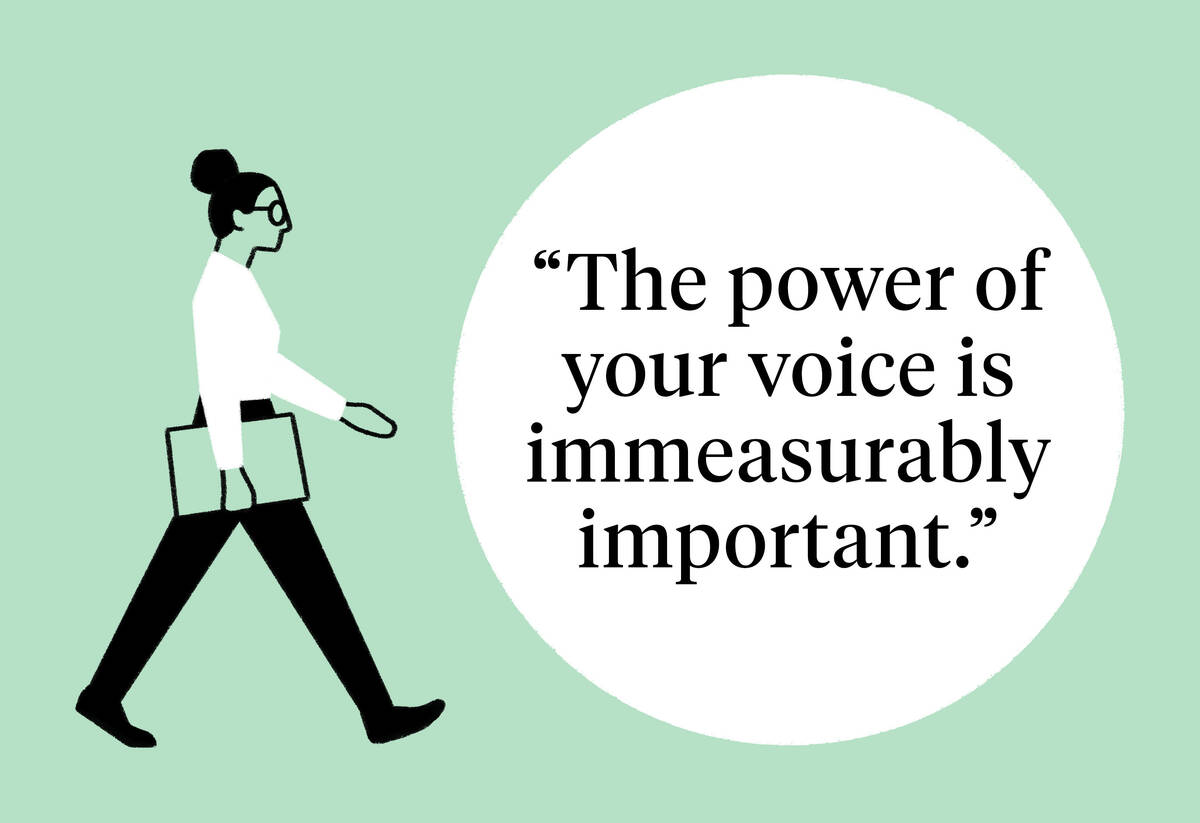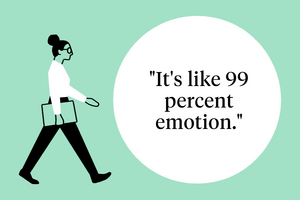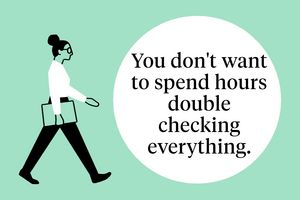Leadership Careers May 23, 2022
Podcast: Executive Presence—Do You Have It?
This week, an episode from the archives: It’s not enough to be good at your job. On this episode of The Insightful Leader, learn how to develop the gravitas that commands attention and respect.

This episode was originally posted on June 11, 2021.
Some people just have a way about them. They walk into a room and everyone knows that they’re a leader. Now, if you could only bottle that essence up and use it for yourself...
According to Brooke Vuckovic, a clinical professor of leadership at the Kellogg School, you can. Here’s the formula: Executive presence is equal to credibility plus ease, all divided by ego.
“Executive presence doesn’t measure your merit. It doesn’t measure that intellect or that horsepower,” Vuckovic said at The Insightful Leader Live webinar on the topic. “What executive presence does is it measures your capacity to translate out all of your creativity, all of your good ideas, all of your deep expertise.”
In this episode of The Insightful Leader, we hear from Vuckovic about how to exude an executive presence that’s all your own.
Podcast Transcript
Jessica LOVE: Some people just SEEM like leaders. But have you ever wondered why?
Brooke VUCKOVIC: This topic I love to teach on, and to talk about because it’s one of those topics that we all throw around...the term executive presence...all the time, and yet we don’t quite know what it means when we’re pressed to define that.
LOVE: That’s Brooke Vuckovic. She’s a clinical professor of leadership at Kellogg. And she knows that, even if you DO have what it takes to lead, it takes a little extra something to make people believe it: Executive Presence.
Luckily...she has a rough formula you can use to develop your own gravitas.
VUCKOVIC: Here’s the formula — executive presence is equal to credibility, plus ease divided by ego.
[music]
LOVE: Welcome to The Insightful Leader, from the Kellogg School of Management. Today on the podcast, you’ll be hearing from Brooke Vuckovic...who initially spoke to us at an Insightful Leader Live event...about how to exude executive presence. She’ll explain how everything from your speech patterns...to the way you manage your emotions….work together to convince others that you’ve got...it. And she’ll tell you how to do that...all without losing your authentic sense of self.
Before we dive back into that formula...a couple more disclaimers: One: None of this advice will help you if you aren’t actually good at your job. That’s not what executive presence is.
VUCKOVIC: Executive presence doesn’t measure your merit, it doesn’t measure that intellect or that horsepower. What executive presence does is it measures your capacity to translate out all of your creativity, all of your good ideas, all of your deep expertise.
LOVE: You’re good at your job — you just need help convincing others that you’re someone they should listen to and respect. That’s what we are addressing here.
Disclaimer number two: Consider the cultural context you’re operating in. For example, while strong eye contact is generally valued in many organizations in the U.S., it might be considered disrespectful in others.
VUCKOVIC: So as I go through these areas, think about “hmm, what might be the proxy for this where I am, or in this culture, or in this business organizational environment?”
LOVE: Okay, back to the equation: Executive presence is equal to your credibility plus your ease....and all of that is then divided by your ego.
Vuckovic says there are a few ways to signal that you’ve got that first part of the formula — credibility. One way is your speech pattern.
VUCKOVIC: The power of your voice is immeasurably important. If you’ve been told consistently you speak too quickly, oftentimes it means that your audience cannot track and keep up with you. Your levels of expertise are so high that their cognition can’t catch up and process what you’re saying at the rate at which you’re speaking.
LOVE: Vuckovic says some people might think that, by speaking faster than they can comprehend, you’re trying to confuse them on purpose. Some might think you’re nervous or just not very confident. And while fast-talking can be an advantage in certain situations...like, if you need to get someone’s attention quickly...it’s often best to slow things down.
To do that, she recommends you insert pauses throughout your talk or speech.
VUCKOVIC: Those pauses signal that you are comfortable with silence...they can signal that you’re making an important point...they can signal that you’re ready and willing to be challenged at a specific point in time.
LOVE: Speed isn’t the only part of your voice that’s important to mind. The tone of your voice can also affect how people perceive you. For example, if you tend to speak in a monotone voice, and you don’t use a lot of inflection, it can be hard for people to comprehend what’s important and what isn’t. A lack of inflection can also make it harder to keep people’s attention.
For that, Vuckovic recommends reading books aloud. CHILDREN’S books.
VUCKOVIC: Children’s books are highly variable in their characters and the emotions that are displayed. The language is simple, the plot lines are simple, so we usually don’t breeze when we’re reading them. Bonus points if you’re actually reading them to a kid. The child will be a captive audience.
LOVE: Maybe you’ve been told your voice is high-pitched and that you should work on that...first of all, Vukovic hates this type of advice. At the same time, she points to a body of research that DOES suggest people associate deeper voices with being successful and more sociable. Higher voices tend to be associated with descriptors like grating, annoying, or too young. Which again, is NOT fair.
That’s why...Vukovic doesn’t want you to try lowering your voice.
[music]
VUCKOVIC: Instead, I would invite you to think about vocal power and breath control. How are you able to create enough vocal power that you can have the volume that you need? All volume is, is a question of taking in a lot of air and expending it quickly. And when you’re doing that from your belly breath...versus speaking from a high...this is me speaking from my highest chest voice, and you likely have a very different response to me here.
LOVE: Still not sure what we mean by down low versus up high? When Mariah Carey hits that high whistle tone in the song “Emotions?” That’s a head voice. When Whitney Houston hit the main chorus of “I Will Always Love You?” That’s from down in the chest. And while both of these singers’ vocal styles command power in their own ways, the chest voice is going to give you that powerful volume Vuckovic is talking about.
To recap: Vuckovic recommends speaking at a measured pace, speaking with inflection and speaking with vocal power. All of this conveys credibility.
Let’s pause for a second to reflect on the fact that….we just talked SO MUCH about our voices. And a lot of this advice feels like instructions to sound more like a powerful, credible, neurotypical...English-as-a-first-language...man. But Vuckovic says that the more diversity we see in leadership roles, the more our ideas about what a leader looks like...and sounds like...will change.
That’s where ease comes into the equation. Remember our formula? It’s credibility, plus ease, all divided by ego.
So, where credibility is about making people believe that you are competent, ease allows you to do that same thing, without losing sight of who you are. It’s about being at ease with yourself. It’s about being authentic.
For example, if English is your second language and you take slightly longer to choose your words...the solution shouldn’t mean you get rid of your accent. Instead, your best bet is to do little things to put yourself at EASE about having an accent. Basically, to worry less. Vuckovic has a strategy for you.
VUCKOVIC: My recommendation, typically, in those circumstances is to prepare and get into the conversation early. So if you make a comment early on, even if it’s about the agenda. “Wow, I really liked what you said about X, Y and Z.” Then you are already seen as a part of the group, most importantly internally. And that cognitive load, that psychological load of worrying about it, releases. It’s like a pressure cooker where the steam valve goes off.
LOVE: Being authentic — being at ease with yourself — means being who you are, but without giving off the impression that you are INSECURE about it.
Here’s another example of what that could look like. If you are a highly energetic individual; if you need to MOVE to focus during meetings that tend to be stationary, Vuckovic says...when you are able — and you won’t always be — but when you are able...TELL people that.
VUCKOVIC: Just letting people know “I’m going to be standing.”
LOVE: Authenticity is about being yourself and normalizing that for others. It’s why executive presence will look different from person to person. It’s why you probably know people who have very different personalities, voices and leadership styles...but who are effective and believable in their own unique ways.
Now, there IS another side to this. If you tend to let your anger dictate how you respond to people…that you WILL want to change. We’re not going to include that in the list of things that makes you authentically you.
Because ease...is also about your ability to adaptively control your emotions when things get sticky. And that’s important because your demeanor can tell people whether you’re someone they can depend on in a pinch.
If you DO tend to have a hard time wrangling your feelings...Vuckovic says you should take a closer look at your diet. No, really.
[music]
VUCKOVIC: And by diet, I mean, is there any food in your food? If we are biological first, and our systems are not meant to withstand stress, and do not have the capacity for resilience...if we are living on Diet Coke and Cheetos. So, thinking about diet, if you’re having a hard time and feeling enormous amounts of stress, and feel like you’re incredibly frayed at work, how’s your diet?
LOVE: And...how are you sleeping? Are you exercising enough? All of these lifestyle choices help when you need to keep your cool in situations that are decidedly NOT cool.
You might hate this advice because you’ve heard it a million times from doctors and read it in articles about wellness. But...honestly...have you done it? Vuckovic says to give it a try. Here’s another way to manage your stress: Give it a name.
VUCKOVIC: When you are able to accurately name, either the emotion that you’re feeling … “I’m so frustrated. Disappointed, angry, scared, uncertain, happy” — whatever it is, when you are able to name those emotions…as psychologists say...when name it, you tame it.
LOVE: So, if you’re already feeling like the day has thrown every possible obstacle in your face, and suddenly a colleague asks you a question about something you’ve repeatedly addressed in meetings and emails...and you want to explode….take a second. You DON’T want to respond while you’re knee-deep in that anger.
[music]
VUCKOVIC: You could say internally — this is all internal monologue — “heart’s racing. I can feel my face is getting flushed. My hands are getting sweaty. My stomach is getting knots.” You simply start to describe the physical sensation that’s occurring at that time, and your central nervous system will deescalate and calm down. And the idea there, is then you can be a choice.
LOVE: There’s a school of thinking in psychology that...if you’re aware of your feelings...you can have power over them. The thought process could sound something like this: “oh, I know what’s happening here...my body is getting tense right now because ...sure, I’m annoyed that this colleague didn’t think my emails were important enough to read them....but I don’t normally feel THIS tense about these sorts of things...why? Well, I might be feeling a little more annoyed than usual because my car got rear-ended on the way to work, and now I have to deal with that. My child is having trouble in school and that also stresses me out...so I think that’s what’s going on
here. And...I guess by knowing that, I am not going to react to my colleague with the full force of my anger.”
Vuckovic says she’ll hear from a lot of people that...they just DON’T think they have the tools to analyze their emotions in this way. Her response?
VUCKOVIC: My first counsel is get them...legitimately work to learn to label your emotions. This is an incredibly powerful tool for you, but it also turns out that it’s the description that is the magic here
LOVE: This isn’t to say that emotions aren’t appropriate for the workplace. We’re human, after all. But there’s a difference between expressing emotion...and being washed away by it.
So, let’s rewind: Ease is about being comfortable with who you are...being authentically yourself...AND it’s about your ability to be present with other people...and to thoughtfully respond to them...without getting swept up in an emotion you’re feeling at the time.
And here we arrive at the last part of our equation. Ego. Once again....executive presence is credibility plus ease, divided by ego.
So, let’s imagine you’ve got your speech patterns down...you’ve nailed your inflection....and people are now convinced of your credibility. You’ve also shown that you are at ease with yourself and that you easily weather emotional turbulence.
All of this is great! This is an important part of projecting executive presence. Unfortunately none of it matters if your ego is nearly as big — or BIGGER — than all of those great qualities put together. Because, again, executive presence is credibility, plus ease, DIVIDED BY ego.
The super-obvious example of an ego that’s too big is...someone who is really cocky...maybe they talk over others because they believe their ideas are better. They care about themself the most.
A healthy ego...looks quite different.
VUCKOVIC: My favorite quote to help calibrate individuals on ego is from C.S. Lewis, and it’s this: “true humility is not thinking less of yourself...it’s thinking about yourself, less.” What we’re looking for here is true confidence and true humility.
LOVE: In practice, that could mean waiting to express your point of view during a meeting...until others have spoken. It shows that you are informing yourself before speaking. It shows you believe that you — and others — have something to contribute.
But there’s a less obvious way of looking at ego, too, which boils down to thinking about oneself in a different way.
VUCKOVIC: When we look at studies on underrepresented minorities, or when we look at studies on women in the workplace when there’s a dearth of role models available to them, when they worry less about what people are thinking about them and how they’re assessing them, and focus more on their purpose, their values, their contributions...why they do the work that they do...they typically fare better — both in how they’re evaluated, as well as releasing some of that psychological weight of considering all the time how other people are assessing them. So thinking of yourself less works on both ends of that ego spectrum.
LOVE: It is VERY important to say here...that if you are someone who identifies with a group that’s been historically undermined...overlooked...or held back — that is so incredibly real. Your concerns about how people perceive you are valid. Vuckovic’s point is not that your experiences are imagined. And she is CERTAINLY not saying that thinking about these things makes you selfish.
What Vuckovic IS saying, is to never lose sight of your purpose, as a leader. Remind yourself why you rose to the role of a leader...or why you WANT to be a leader…and anchor yourself to that purpose again and again.
Executive presence is a simple formula, and yet it’s not. Sure...credibility, plus ease, divided by ego….sounds pretty cut and dry. But with each of these...comes a dial ...that you can adjust to fit your own needs, and the needs of your organization.
To show just how different a leader can look, Vuckovic points to the movie “Spotlight.” If you haven’t seen it, it’s a movie about the Boston Globe’s investigation into child abuse by Roman Catholic priests. This movie offers plenty of examples to learn from:
VUCKOVIC: I like to highlight this one because the leader here, Marty Baron — who ran the Boston Globe at the time that this particular case took place — he was seen with suspicion; he violated every rule; his dials were all turned down on those elements of credibility; when he first introduces himself to the team, he’s awkward he can’t look at anyone, he’s fussing with papers. He doesn’t ...they say he’s an outsider, he’s not from this, he’s not from this, but his ease when pressured? He shines. He stands strongly by his principles as these individuals are investigating this particular issue in the Boston area. And that is where he starts to build his extraordinary presence in a very different way.
[music]
LOVE: You KNOW what you’re doing. Do it with confidence, do it with humility, and you might even reshape people’s ideas of who a leader can be.
[music and credits]
Laura PAVIN: This episode of The Insightful Leader was produced by Jessica Love, Emily Stone, Fred Schmalz, Kevin Bailey and Laura Pavin. It was written and mixed by Laura Pavin, and it was edited by Jessica Love and Emily Stone.
And, if you want more leadership tips from real experts, you should sign up for our free weekly email newsletter. It’s packed with ideas and research from one of the world’s top business schools…the Kellogg School of Management at Northwestern University. To sign up, go to http://kell.gg/email. As a reminder, you can find us on iTunes, Google Play, or our website. If you like this show, please leave us a review or rating. That helps new listeners find us.


